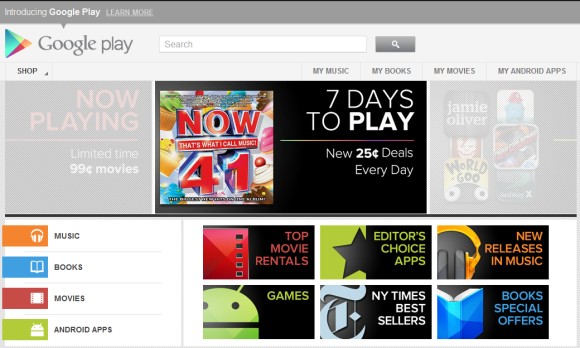Google announced the launch of a new service called Google Play, “a digital entertainment destination where you can find, enjoy and share your favorite music, movies, books and apps”. Google Play is the new name for the Android Market, an all-encompassing brand that also integrates Google Music and Google eBook Store. It’s just like iTunes, except that it’s born on the Web and you don’t need special software to play music or read books.

“Our goal with Google Play is to bring together all your favorite content in one place that you can access across your devices. Specifically, digital content is fundamental to the mobile experience, so bringing all of this content together in one place for users makes the Android platform even more compelling. We’re also simplifying digital content for Google users – you can go to the Google Play website on your desktop and purchase and experience the latest movies, music and books,” explains Google.
The Android Market app will have a new name (Google Play Store) and this may confuse a lot of people. After all, Android Market is one of the few apps that are bundled with most Android devices. Google Play brings the same features that were available in Android Market and it’s still targeted to the Android users, but the new brand no longer includes “Android”. This allows Google to create a single destination for multiple platforms: iOS, Windows Phone, Google TV, Chrome / Chrome OS.
“On your Android phone or tablet, we’ll be upgrading the Android Market app to the Google Play Store app over the coming days. Your videos, books and music apps (in countries where they are available) will also be upgraded to Google Play Movies, Google Play Books and Google Play Music apps,” informs the Google Blog.
Google Play Music is only available in the US, Google Play Movies is available in the US, UK, Canada, and Japan, while Google Play Books only works in the US, UK, Canada, and Australia. That means most Google Play users will only be able to install Android apps.

Google Play is a catchy name, it’s platform-agnostic, flexible and could encourage more people to buy music and books even if they don’t have an Android device. Android users will have to get used to the new name and the new visual identity.
{ Thanks, Andrew. }